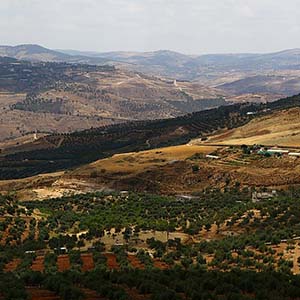Gilead

Bible References
Genesis 31:21–25
Genesis 37:25
Numbers 26:29–30
Numbers 32:1
Deuteronomy 3:12–17
Judges 7:3
Judges 11:1–2
Psalms 60:7
(rocky region)
- A mountainous region bounded on the west by the Jordan, on the north by Bashan, on the east by the Arabian plateau, and on the south by Moab and Ammon (Genesis 31:21; Deuteronomy 3:12-17). It is sometimes called “Mount Gilead” (Genesis 31:25), sometimes “the land of Gilead” (Numbers 32:1), and sometimes simply “Gilead” (Psalms 60:7; Genesis 37:25). The name Gilead, as is usual in Palestine, describes the physical aspect of the country: It signifies “a hard, rocky region.” The mountains of Gilead, including Pisgah, Abarim, and Peor, have a real elevation of from 2,000 to 3,000 feet, but their apparent elevation on the western side is much greater, owing to the depression of the Jordan valley, which averages about 3,000 feet. Their outline is singularly uniform, resembling a massive wall running along the horizon. Gilead was specially noted for its balm collected from “balm of Gilead” trees, and worth twice its weight in silver.
- Possibly the name of a mountain west of the Jordan, near Jezreel. (Judges 7:3). We are inclined, however, to think that the true reading in this place should be Gilboa.
Smith's Bible Names Dictionary (1866)